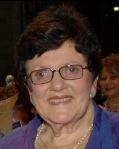
As part of our regular segment, Our Community Leaders - Great Australian Leaders in Focus which features the thoughts of some of Australia's great leaders, this month we feature The Hon Joan Kirner AC.
Joan Kirner began her working life as a school teacher and later became the highly prominent president of the influential lobby group, Victorian Federation of State School's Parents Club. She joined the Labor Party in 1978 and was elected to Parliament in 1982, becoming Victoria's first female Premier in 1990. Since leaving Parliament in 1994, Joan has continued to work tirelessly as a community activist, advocate, champion for the advancement of women and social justice campaigner. She is currently the Victorian Community Ambassador.
On 11 June 2012, Joan was named an Companion of the Order of Australia for "eminent service to the Parliament of Victoria and to the community through conservation initiatives, contributions to gender equality, the development of education and training programs and the pursuit of civil rights and social inclusion".
Who do you consider to be three great leaders of our time and why?
- Mary Robinson, Former UN Human Rights Commissioner
- Human Rights, Women's Rights, Gender Equity
- Nelson Mandela, Former President of South Africa
- Courage, Conscience, Compassion
- Freedom of the Human Spirit, Compassion,
- Empowerment, Oratory
- Paul Keating, Former Prime Minister of Australia
- An Australian Republic: independent, proud, democratic, respected, reconciled, innovative, progressive, nuclear free.
- Inspirational vision and leadership in policy, advocacy and action.
- Understanding that the best and most lasting decisions are made when people affected by the challenges are part of identifying and implementing the solutions.
What are the three attributes you consider to be essential to a leader?
- Be clear about your values and what you stand for in words and practice;
- Be committed to social and economic inclusion and community ownership, participation and environmental sustainability, innovation;
- Be respectful of people and place and have the courage to stand firm when that respect is challenged.
What are the greatest barriers to new leaders emerging in Australia?
- Individualism and lack of understanding of the lessons of history and the benefit and importance of acting together for the common good;
- Short-term political polling and popular media domination of our nation's public dialogue and action on key issues including human rights and equity;/li>
- Inability or refusal to see the big picture and link it with the community's understanding of how they can improve their own lives and the lives of others./li>
What advice would you give to a potential leader to take them to the next stage?
- Believe in yourself and your power to be part of creating a better society;
- Think big;
- Be clear about your central purpose in all that you do;
- Work as the leader of a team;
- Act with the community not on them;
- Give respect: gain respect. Don't be afraid of risk and share responsibility. The best and most sustainable solutions are those made with and by the community affected by those solutions.
What insights have you gained personally on your leadership journey and how have they impacted on your style of leadership?
- Collective wisdom and action achieves more and is more enduring than individual ideas and action;
- Know what you stand for and live your life through these values. Or as my parents would have said:
- "practice what you preach"
- "if something needs doing - do it yourself and be sure you take others with you."
- Be clear about the difference you want to make and how.
Who have been your own leadership mentors and how did they assist in developing your own leadership style?
- Dr Jean Blackburn - Jean taught me that closing the Economic and Education Gap is the key to a healthy, cohesive, progressive and inclusive society;
- My parents - taught me their values of community action, respect for people as equals and the social justice ideals of the Labor movement;
- Feminists who have shown me the importance of achieving gender equity in expanding and organising the power of women in the economic, environment and social arena.
Thinking about your own leadership journey, what are you most proud of and what would you change if you had the chance?
- Being the first woman Victorian Premier and hopefully demonstrating to young women that they too can take the opportunity to be a leader.
- Education Reform: The Disadvantaged Schools Program, integration of children with disabilities into regular schools, the introduction and success of the broader curriculum of the VCE in increasing the retention rates in schools, and introducing gender equity into in schools and the Education Department.
- De-institutionalisation.
- The Landcare Movement; the Rural Women's Network; Flora and Fauna Guarantee Act; Extension of National Parks including East Gippsland and Alpine.
- Deciding that the Victorian Women's Trust should become a viable independent Trust to advance the causes of women.
- Family Violence and Rape Law Reform.
- The Public Service Equal Opportunity Act.
- Legalisation of Abortion.
- Beginning in 1993, Labor's Affirmative Action Campaigns and in 1996 the creation of Emily's List, enabling more progressive women to be elected to Parliament and become political leaders (e.g. Julia Gillard, Prime Minister of Australia). In 1980 there were about 60 Labor women in Parliaments across Australia: there are now 152 Labor women MPs.
If you had a magic wand, what would you change about community life in Australia right now?
I would work with others to close the poverty, economic and social inclusion gap between communities and within communities and to end violence against women.
Published May 2011
